Do you want to add the Disqus comment system to your WordPress website?
Disqus is one of the most popular comment platforms on the market. It’s known for its user-friendly interface and comment hosting service, making it a go-to choice for popular sites like PBS and Bloomberg.
In this guide, we will talk about whether you should add Disqus to your website and how to enable it in WordPress.
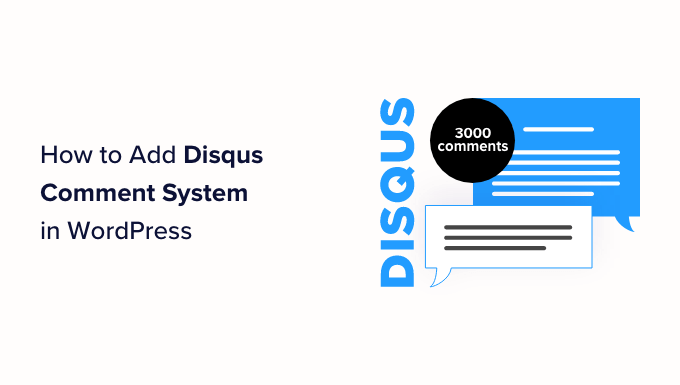
Should You Use Disqus With WordPress?
Disqus is one of the most popular third-party comment systems available for WordPress users. Apart from its user-friendliness and customization options, it also offers a third-party hosting platform for storing and managing comments.
Since Disqus handles comments on a separate server from your WordPress hosting, using it can help your website’s overall performance. That’s why many WordPress users use it as an alternative to the default WordPress comment system.
That said, in our opinion, Disqus is not the best comment system we’ve tried. While it helped with our website performance, we were not a fan of its moderation capabilities, and it added affiliate links to our content without our permission.
After disabling Disqus, we saw our comment engagement rate increase significantly. You can read more about our experience in our Disqus review.
Of course, whether you choose to use Disqus or other platforms is up to you. But if you are looking for Disqus alternatives, then we have some recommendations.
What WordPress Comment System Should You Use Instead of Disqus?
After trying out different comment plugins, we have found Thrive Comments to be the best Disqus alternative.
Thrive Comments is an all-in-one comment plugin with an easy-to-use interface that is perfect for blogging beginners and experts alike.

Besides comment management and moderation features, you can use Thrive Comments to boost user engagement with post-comment actions. After the user leaves a comment, you can redirect them to related posts or a custom thank you message with a free gift.
Furthermore, you can add likes and dislikes as well as upvotes and downvotes to encourage audience interaction in your comment section. Plus, you can send commenters notifications when their comment gets replies.
For more details, you can see our review of the Thrive Themes suite, which contains a section specifically about Thrive Comments.
If Thrive Comments doesn’t suit your needs, then you can also check out our full list of the best WordPress plugins to improve comments.
If you are still interested in using Disqus, don’t worry. We will walk you through how to add the Disqus comment system plugin. You can use the quick links to skip to different sections:
Step 1: Create a Disqus Account
The first step to installing Disqus comments in WordPress is to create a Disqus account. To do this, you need to go to the Disqus website (disqus.com) and sign up.
Once you’ve done that, you should see the page below. Just go ahead and click ‘I want to install Disqus on my site.’
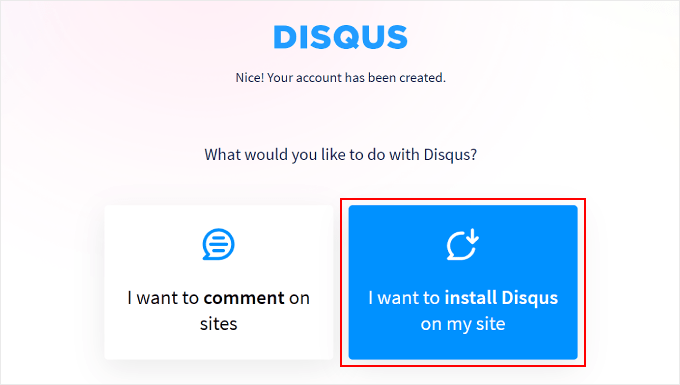
On the next page, you will have to add the details for your new Disqus site, which is where you will manage all your Disqus comments. These include Site Owner, Website Name, and Category.
In the Website Name field, you can insert your desired Disqus site subdomain. After that, simply click ‘Create Site.’
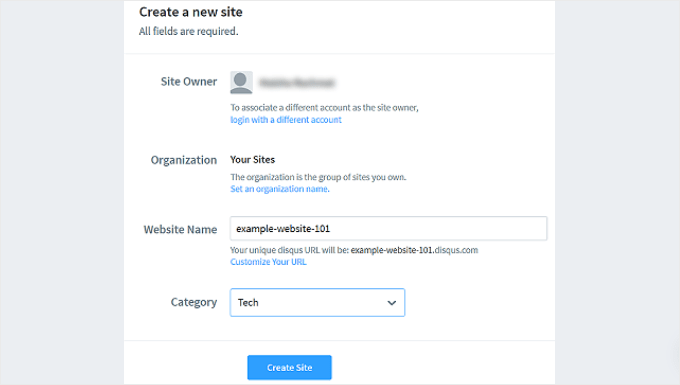
You will now arrive at the Disqus site dashboard.
At this point, you will need to pick one of the Disqus plans to be able to set up the comment system in WordPress. If you are not sure which one to use yet, then you can get started with the free Basic plan.

You will now be asked to choose a platform.
Just select ‘WordPress’ to continue.
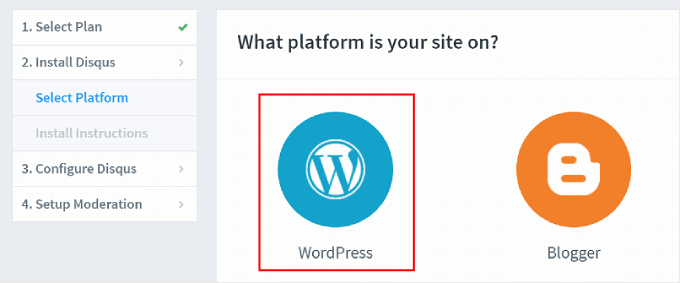
You will now see the WordPress installation page. Take note of the Installation Token field, which will be useful for the setup later.
You can leave this tab open while you continue with the next steps.
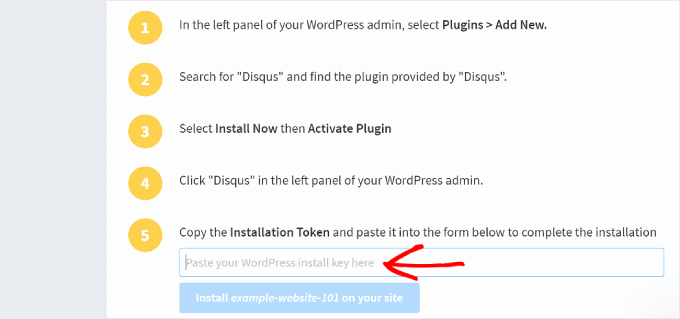
Step 2: Install Disqus Comment System Plugin
Now, open your WordPress dashboard to install the Disqus Comment System plugin. For step-by-step instructions, check out our guide on how to install a WordPress plugin.
After that, go to the Disqus menu from your WordPress dashboard. Under ‘Do you have a Disqus account?’ click ‘Yes.’
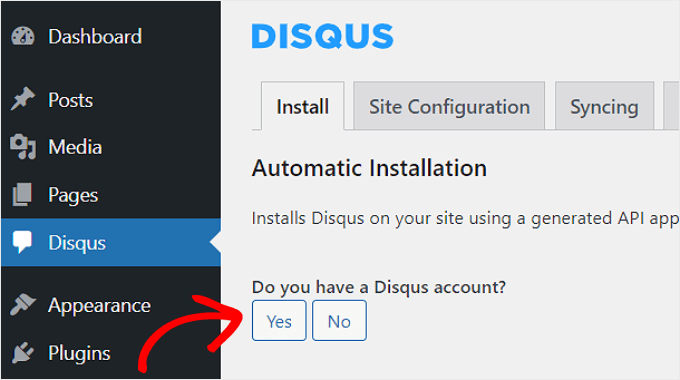
You will now see the question, ‘Do you have a site registered on Disqus you want to use?’
Select ‘Yes.’
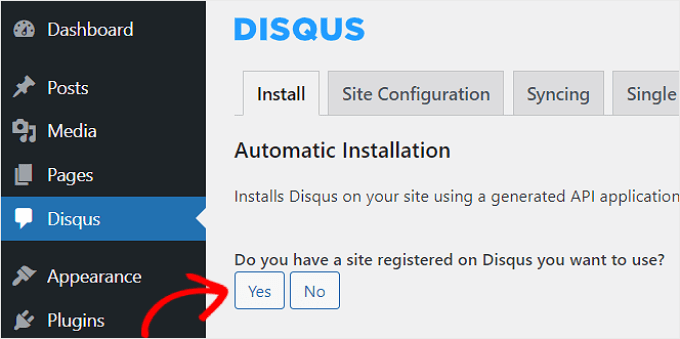
At this point, you will see some WordPress installation instructions and a sync token to copy.
Go ahead and click the ‘Copy’ button here.
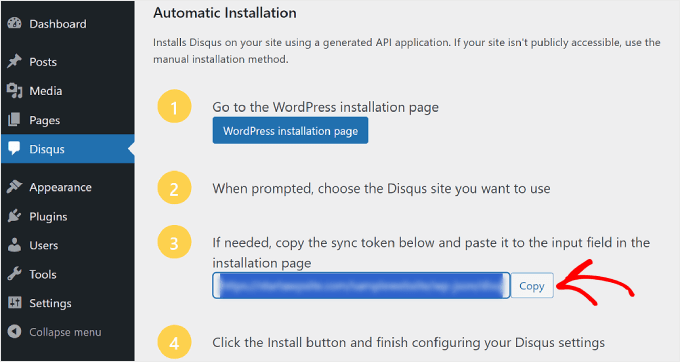
Let’s now return to the Disqus website. Paste the token you’ve just copied from the WordPress dashboard in the appropriate field.
Then, hit the ‘Install [Disqus site name] on your site’ button and click ‘Configure’ at the bottom.
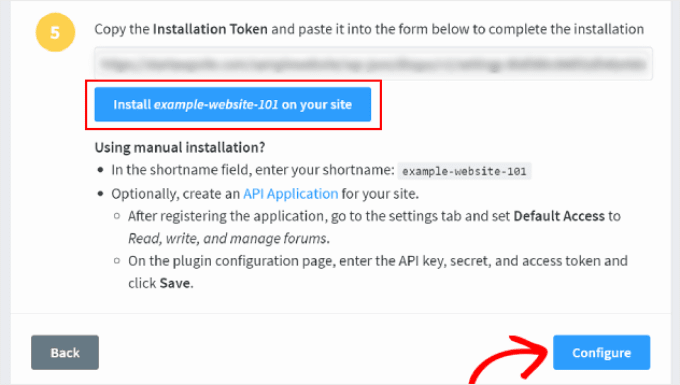
And that’s it!
If you refresh the Disqus menu in your WordPress dashboard, you should now see an interface similar to this:
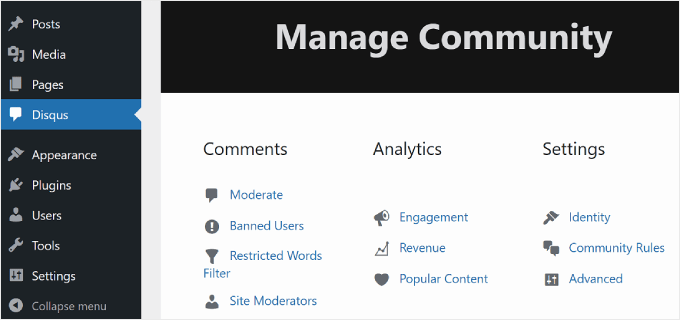
Now, let’s see if Disqus has been successfully enabled in your comment section.
Simply open a WordPress blog post on the front end and scroll down to the comments. Here’s what it should look like if the installation was done correctly:
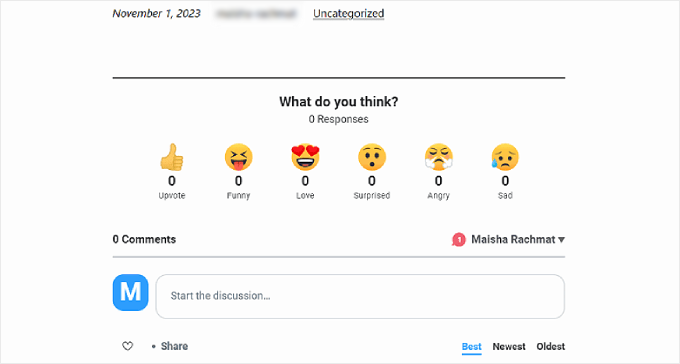
Step 3: Import and Export Older WordPress Comments into Disqus
Once you’ve installed the Disqus commenting system, it will take over the native WordPress comments on your site. In other words, the existing comments stored on your WordPress website will not be visible to users.
To fix this, you will have to import any existing comments into the Disqus commenting system. In the WordPress admin area, go to the Disqus plugin’s settings page, scroll down, and navigate to the ‘Syncing’ tab.
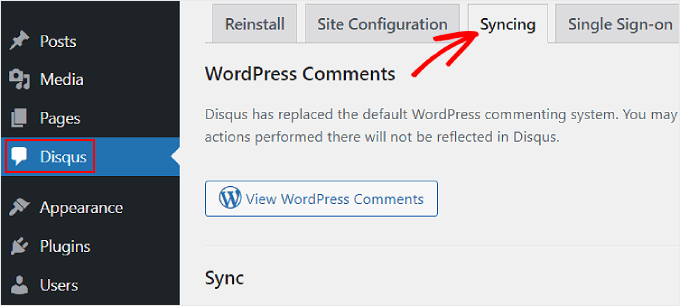
Then, scroll down and select ‘Import Comments.’
You will see which of your comments have been successfully imported in the table at the bottom.
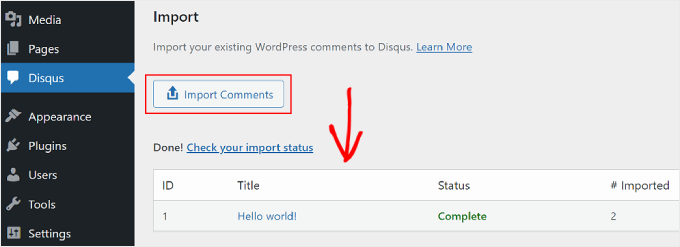
One thing to note is that if you have custom post types, then you may notice that your older comments are not appearing after switching to Disqus. To resolve this, you will need to deactivate Disqus on custom post types.
For hands-on guidance, check out our article on how to disable Disqus on custom post types.
How to Moderate and Configure Disqus Comments
If you want to moderate comments using Disqus, you can click the ‘Moderate’ button on the Disqus plugin page.
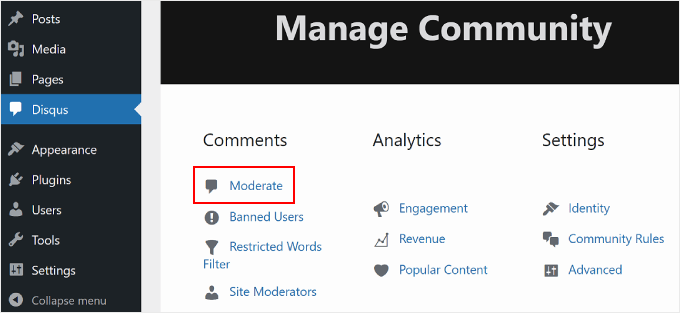
This will bring you to the moderation page on the Disqus website.
If you’re familiar with the WordPress comments page, then navigating the Disqus one won’t be a problem. Here, you can approve, delete, or mark comments as spam.
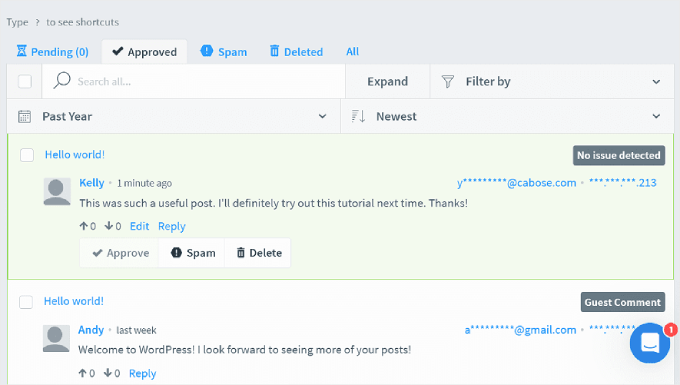
For tips and tricks on WordPress comment moderation, you can check out the following articles:
- Beginner’s Guide on How to Moderate Comments in WordPress
- How to Allow Blog Users to Moderate Comments in WordPress
- How to Allow Users to Edit Their Comments in WordPress
How to Troubleshoot Disqus Comment Display Issue
On some WordPress themes, the Disqus comment area may appear wider than the rest of the post area. To fix this, you will need to add some custom CSS to your theme or child theme’s stylesheet.
While you can add custom CSS through the theme file editor, we don’t recommend it. Tracking changes becomes tricky, making it unclear which code is from the theme and which is custom.
Instead, we suggest using WPCode, which is the easiest code snippets plugin. It lets you safely add and manage custom code on your WordPress site. If the code doesn’t work, then you can easily remove the snippet within the plugin.
The code you will need to add is below:
#disqus_thread {
margin: 0 auto;
max-width: 650px;
}
This CSS sets the max width of the comment area to 650px and centers it on the screen. Your theme may have a different width, so you will have to adjust it to meet your needs.
For a step-by-step tutorial, you can read our guide on how to easily add custom CSS to your WordPress site.
Here’s what it should look like on WPCode:
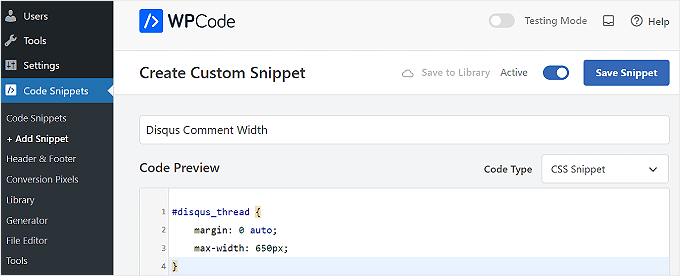
Learn More Ways to Manage Your WordPress Comments
Using Disqus is just one way to manage your WordPress comments. Here are more guides you can check out to improve your comment engagement:
- How to Allow Users to Report Inappropriate Comments in WordPress
- How to Install and Setup Facebook Comments in WordPress
- How to Paginate Comments in WordPress (Step by Step)
- How to Add Videos and More in WordPress Comments with oEmbed
- How to Allow Users to Edit Their Comments in WordPress
- How to Style the WordPress Comment Form (Ultimate Guide)
- How to Send a Thank You Email to Blog Commenters in WordPress
We hope this article has helped you learn how to add the Disqus comment system in WordPress. You may also want to check out our guide on how to feature or bury comments in WordPress and our expert picks for the best WordPress plugins to grow your website.
If you liked this article, then please subscribe to our YouTube Channel for WordPress video tutorials. You can also find us on Twitter and Facebook.





Syed Balkhi says
Hey WPBeginner readers,
Did you know you can win exciting prizes by commenting on WPBeginner?
Every month, our top blog commenters will win HUGE rewards, including premium WordPress plugin licenses and cash prizes.
You can get more details about the contest from here.
Start sharing your thoughts below to stand a chance to win!
Aaron Jane says
Hello,
I’m getting lot of spams on my site with the default comment system, though I have akismet installed. Thought about using Disqus, but I see that Disqus is no longer used by wpbeginner. Can you share why you moved away from disqus ?
Thanks Aaron.
WPBeginner Support says
Here is why we switched away from Disqus.
Admin
Theo says
Thanks a whole lot for this post. I’ve decided to start using disqus for some of the same reasons you mentioned here. This was helpful!
Mohammed Haseeb says
Okay. I know Disqus is good but I have a question. Is there a way to remove hyperlinks from profile names of people commenting on my blog posts. Here is the link to my blog
AlleXyS says
Hello … I tried some days to activate disqus on my website. CAN’T , due of a issue in database…. I install disqus (plugin) => comments => disqus => tell me to upgrade my DATABASE !! I click UPGRADE, but nothing happening, my website tell me that this page can’t be found .. So, I think the script can’t run
here I can’t arrive : http://cdn2.wpbeginner.com/wp-content/uploads/2014/04/disqus-signin.png
WPBeginner Support says
Please contact Disqus support they would be better able to help you with that.
Admin
WPBeginner Staff says
Disqus.
Adjie Al-Faruq says
how to fix “unable to connect to the disqus api servers”
Bora M. Deniz says
Hi, very simple expression and useful article. I’m between jetpack plugin and disqus system .Which one is the more useful for visitors and further SEO of website ?
Santhosh Veer says
when i try to import the worpdress comments i show error please help me to fix this
Andreia Franco says
I have disqus on my blog for a couple of months, since then I just have received lots of spams and disqus doesn’t work at all. I see disqus on other wordpress blogs and it seem to work very well. I do not know what to do with mine. I always go back to moderate and try to activate it but it doesn’t work, still. Do you have any suggestions?
couture31 says
SOOO glad to have you all as a resource! I have transitioned to a self-hosted WP site and I visit your site daily for tips! Thanks for your help and patience…the step by step directions are awesome!! So grateful!
WPBeginner Staff says
Edit the post and make sure comments are enabled for that post. Also go to Settings > Discussion and make sure that the box next to ‘Automatically close comments on articles older __ days’ is unchecked.
UgochukwuEmmanuelAgbams says
Thanks for this tutorial. I have earlier registered on disqus, installed and activated the plugin, but ny problem now is, at the footer of my blog post after disqus, I have a report that says, ‘comments are closed’, and another issue is, disqus does not sync with my loged in users. What should I do about this?
Kerryvaaine says
It is available as a plugin in wordpress.
Neal Umphred says
My experience trying to get Disqus onto my site does not resemble anything like what you have written above. It’s an hour later and I can’t get anything happening . . .
Teresa Robeson says
I sympathize because it is the same for me. There is no “plugins” link on my admin page, nor is there any option for adding Disqus (or anything else) under the Comments link. Maybe it’s because I’ve only got a free WP site, but I didn’t have this much trouble installing Disqus on my Blogger site. There are days I really hate WordPress.
I hope you got it figured out since you posted 2 weeks ago.
Dennis says
I personally have used jetpack comments for comment on site to handle spam. Most persons I have noticed are usually uncommon with the disqus concepts and dislike the sign up process, very few notice the ‘guest’ option. But I’m looking into using Vanilla comments by integrating vanilla forums into my wordpress website and keep the comment actions completely under my control simples like a good option to me so far from testing.
Aaron Aarons says
I don’t have my own blog but I regularly post comments to blogs that use Disqus. Quite frankly, there is so much I dislike about Disqus that I would never use it, without major future improvements, in a blog I had any control over.
1) Comments either don’t show up at all in Google searches on phrases within them, or they show up as part of the page of the particular commenter’s Disqus comments, rather than as part of the page they comment on.
2) If I save a web page that has Disqus comments, the comments are not saved with the page, and the ability to retrieve the comments depends on the future maintenance of such comment threads by Disqus.
3) I can save a page with comments as a PDF, but then the information about the precise date and time of a comment can no longer be seen even by a mouse-over (nor by looking at the non-existent source), so all one sees is how many days, weeks, months or years before the time the page was saved the comment was posted. This makes it impossible to follow the chronology of a discussion.
4) In one case, a blogger lost his domain name and had to get a new, different one. Since then, the old pages can be accessed with the new domain name, but the old comments do not show. There is a way to get to the original comment thread, but it’s not accessible to the casual user.
There are other, less serious, annoyances, that have slipped my mind for the moment.
If I am wrong about any of the items I had listed as problems above, I’d like to know.
Earl Henson says
I wonder if Google traffic is lower than it would be if comments don’t show in Google? And of course comments would be the same with Disqus but wouldn’t they become higher over time as more people discover this blog? But if NEW users can’t discover this blog because the comments are not Google searchable…..
Codex73 says
Recently installed “Disqus Comment System” WordPress plugin, it displays correctly and accepts comments. When I reply through the Dashboard, these won’t show on thread. Should replies be handled directly in the Disqus thread instead?
Bricky says
Is there a way to display a number in front of each comment using disqus?
Metal Mofos says
What about SEO?
Dave says
Even with Disqus, the comments are fully indexed along with the page. Do a View Source of this page to see for yourself.
Rob Orr says
That’s not necessarily true. It’s possible that Google will index your comments, but I’ve seen many more that are not indexed as opposed to those that are.
WPBeginner Staff says
We wrote about this plugin in our guide on how to add Google+ comments in WordPress.
Animish says
Thanks for this useful article. But there is one question stuck in my mind. Does Disqus affect the load time of posts? Because it uses iframe to load comments. Didi you notice any difference?
Jeanz says
Hello Syed. What you think about this plugin? – WordPress Comments Evolved – that allow to display G+ comments, FB comments, WordPress and Disqus. I can’t find any useful review in google search, thanks
Mehmet Fatih Yorulmaz says
I have two problems about Disqus (which I already use):
First, it does not allow me to convert my commenters to subscribers by adding a checkbox to the bottom of the comment box. Normally, I was using Mailchimp Comment Optin plugin for this. Also, it does not work with “Comment Redirect by Yoast” plugin…
Second problem is, Subscribe button is difficult to notice for inexperienced commenters. In wordpress comment box, the simple checkbox for subscribing to the replies was very easy to notice. Also, guest commenters are by default subscribed to all comments. And they are not given option to subscribe to “only replies”. Last, but not least, the word “subscribe” is very ambigious. What is it? Subscribe to my site, subscribe to my newsletter or subscribe to the comments?…
Third issue is, language support. My site is in Turkish and I can select Disqus interface to be in Turkish. But, when my not English speaking visitor hits “Subscribe”, they are sent an English confirmation email. Or when they wanna edit their subscription preferences, again they are being forwarded to an all Engish page.
I appreciate your thoughts on these issues…
Thanks
WPBeginner Staff says
Manuel, we haven’t noticed any decline in the number of comments we receive on WPBeginner.
Manuel Echeverry says
its true but there a some WP pages that claim that have to disable disqus because the visitors dint like it. I personaly use Disqus in my site and have no bat experiences until now, but its something that we have to pay attention
Manuel Echeverry says
I love disqus but the are some people that claim is hard to use por the blog visitors making you lose commenters, wath do you know about that
WPBeginner Staff says
No actually the number of comments is nearly the same as before. There is less spam though.
Gagan Masoun says
Now, you are also getting too many comments after adding Disqus comment system…
khoaplus says
Disqus can not be integrated with CommentLuv
Muhammad Tahir says
Thanks your articles are awesome
Golam Rabbani says
I am going to add disqus in my blog. I think it can help me to avoid spaming comment. Thanks for your nice tips.
WPBeginner Staff says
Please clear your browser cache or try in a different browser.
WPBeginner Staff says
Andor, we checked the plugin with floating social bar. Both plugins are working as expected. Are you its Disqus causing the issue?
Andor Nagy says
Pretty sure. For me it isn’t floating neither here nor on my website. I maybe caused by browser cache.
WPBeginner Staff says
We will try to look into this in some future article. Meanwhile you may contact disqus support they may already have a solution for this.
Nicolas Messer says
Could you maybe just go into some more details regarding custom post types…I was searching for a solution how to get previously made comments on a CPT into disucss but didn’t have any luck and read in the other post that you ran into that same issue as well. Thanks a lot!
Peder B. Helland says
Very nice article! I love Disqus – it both works and looks great.
Andor Nagy says
Thanks for the tutorial! Unfortunately if you install the plugin, the floating social bar won’t float anymore.
WPBeginner Staff says
No it does not.
Lại Đình Cường says
Does Disqus make my blog slow?
WPBeginner Staff says
Yes you should activate sync Disqus with WordPress.
vinod says
Thank you for the article.
I have more than 75000 (75k) comments and I am unable to import them to disqus from my wordpress site. It would be great if you can explain how large number of comments can be imported and integrated seamlessly between wordpress and disqus.
Thanks a lot.
WPBeginner Staff says
No you don’t need Akismet anymore.
WPBeginner Staff says
Disqus improves page speed which is good for SEO. When a user leaves a comment on your blog you can get their email from the Disqus admin page.
bouncedancer says
Thank you for this very informative article. You guys epitomize what’s great about the internet.
Abhisek Padhi says
Disqus was important for Wp-Beginner To Scale up. I wasn unable to properly implement disqus SSO (Single sign on) feature. First I requested disqus to enable the SSO for my site, then i created an application, copied the api keys to my disqus plugin. Added logo’s. Now when a user tries to use SSO in disqus comments a login windows opens and if he/she is a new user, he/she register’s then log in. Here the problem arises, after logging in, the window must close automatically and the user should be redirected to the page from which he left, unfortunately the login windows don’t dissapear, rather it log’s into WordPress dashboard, which is very undesirable behavior. They (disqus) recommend using window.close() javascript, but i couldn’t figure out how to use and where. See, if you could help. This solution will help a lot of wordpress users using disqus.
WPBeginner Staff says
We will try to look into it.
kathir says
Hi sir, I would like to know disqus affects seo and when a user registers can I get their info like email id and name etc ?
Declan Wilson says
Do we still need to use Akismet to filter spam or can we cancel it if we move over to Disqus?
Jesse Brede says
Yeah, I use Disqus on any site that has an active community. The lack of visual control is a bit frustrating, but like iOS, the uniform layout is an advantage as more sites adopt it.
OtakuPT says
One question, “Synk Disqus with wordpress” should i activate this option
or not?
I make this question because of SEO, if i activate this option the comments appear in the source code of the page, if i don’t activate the comments do not appear in the source code.
How does this interfere with search engine optimization? And what is the better option?
Best regards
Luca Rosaldi says
I love Disqus. One huge upside for the end users is that they are automatically updated whenever someone replies to a comment, in an unobtrusive way. It’s like a digital hub for comments.
Jay Castillo says
I also started to use Disqus late last year because of comment spam (I get about 50 to 100 each day even with GASP and commentluv), and switching to Disqus really helped. I then noticed that even Pat Flynn started using it on SPI (also because of comment spam), and now WPBeginner. Makes me feel I made the right choice.
One more advantage with Disqus is registered users can go back and edit their comments just in case of wrong spelling/grammar, etc.
By the way, thanks for the tip on how to prevent Disqus from overriding the comment count. I didn’t know there was a way to do that until now, and I can’t wait to try it out. Thanks for sharing!
RW says
thanks for this post. I haven’t used it before but I’m going to give it a shot. I appreciate you posting these kind of topics.